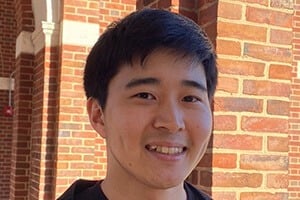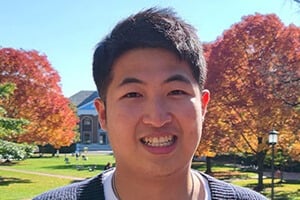The annual Young Investigators’ Day ceremony celebrates the unique contributions of junior researchers and the mentors who helped them excel in their fields. Young Investigators’ Day was established in 1978 to recognize young investigators who are trained at Johns Hopkins University School of Medicine and to provide them with a forum for their work. The awards are intended to recognize research undertaken by applicants while registered as students or postdoctoral fellows at the school of medicine. This year, 15 students, 10 postdocs, and one clinical fellow were selected to receive Young Investigators’ Day prizes.
Five from Hopkins BME recognized at Young Investigators’ Day
Award winners affiliated with Hopkins BME include:

Brian Mog, M.D./Ph.D. candidate – The Nupur Dinesh Thekdi Research Award
Chimeric antigen receptor (CAR) T cells have produced dramatic outcomes in patients with blood cancers, but have had limited success in solid cancers like pancreatic cancer or glioblastoma. One major challenge in solid tumors is the lack of cancer-specific targets that minimize toxicity to normal tissues. The genetic alterations essential for the development of cancer can also be used as immuno-therapeutic targets to specifically kill cancer cells and spare normal tissues. During my Ph.D. with Ken Kinzler and Bert Vogelstein in The Ludwig Center at Johns Hopkins, I developed two types of CAR T cells to target these cancer-specific genetic alterations. The first CAR approach utilized pairs of activating and inhibitory CARs to target the loss of heterozygous genes within cancer cells. In the second approach, components of a CAR were fused with the T cell receptor to target “hot spot” mutations that are presented as peptides on human leukocyte antigens. Both CAR approaches were able to cure mice of cancers containing the targeted genetic alteration without affecting cells representing normal tissues.

Sarah Neshat, Ph.D. candidate – The Paul Talalay Research Award
In the Green Lab and Doloff Lab, what I’ve had the privilege of exploring is unique in that I’m exploring both arms of the immune system when it comes to dysregulation and disease. My research dissertation aims to develop and screen biomaterial-based mRNA nanoparticle formulations to target immune cells, such as antigen presenting cells, for oncology and autoimmune therapies. There is an urgent need for a therapeutic that can engineer the immune system to prevent disease progression at early stages and have a long-lasting and transformative effect on patients. Recent novel nonviral delivery biotechnologies have great potential to impact medicine and are being investigated in clinical trials with a few in the clinic today, such as the current Moderna and Pfizer/BioNTech mRNA SARS-CoV-2 vaccine in addition to Alnylam’s RNAi therapy for rare hereditary diseases — setting precedent for subsequent gene delivery methodologies such as my dissertation.

Jin Woo Oh, Ph.D. candidate – The Mette Strand Research Award
Gene regulatory DNA elements, such as enhancers, are enriched with pathogenic mutations associated with devastating diseases such as cancer and schizophrenia. Despite the significant medical implication, functional characterization of individual enhancers has been difficult. For example, many human genes are regulated by complex networks of enhancers, and it remains unclear how these network properties affect phenotypes and how their disruptions cause disease. Further, putative pathogenic regulatory variants are often tested through their conserved counterparts in mice, but mapping human enhancers to mice has long been a computational challenge due to both rapid evolution and sequence complexities of enhancers. In Dr. Michael Beer’s lab, we addressed these challenges in two orthogonal approaches. First, we collaborated with multiple labs to functionally characterize a large number of enhancers near genes of high medical significance using CRISPR. For example, we epigenetically perturbed enhancers that drive stem cell differentiation, and discovered that enhancers can regulate the speed of cell-state transitions. Fetal development is a finely controlled dynamic process with high spatiotemporal precision, and our discovery will help us understand how enhancer mutations may cause developmental disorders. Second, we developed a novel genome-alignment algorithm (gkm-align) that can detect more than 20,000 novel distal enhancers conserved between human and mouse. Using our novel method, we published an expanded catalogue of conserved enhancers, which we believe will streamline functional characterization of human enhancers. I aspire to contribute to advancements in the diagnosis and treatment of regulatory diseases through our research efforts.

Yang Zhang, Postdoctoral fellow – The Claude and Barbara Migeon Research Award
Species-specific vocalizations are important for the survival and social interactions of both humans and vocal animals. My research projects focus on understanding the underlying neural mechanisms for species-specific vocalization processing in the brain. We use a unique nonhuman primate, the common marmoset (Callithrix jacchus, New World primate), as our animal model. The marmoset is one of the two key laboratory primate models, and provides several important advantages over other nonhuman primates: a rich vocal repertoire, a high reproductive rate while in captivity, a relatively short lifespan, a similar hearing range as humans, and a smooth brain allowing easy access to all parts of the cerebral cortex. We demonstrated the continuity and divergence of the dual auditory pathways in the primate brains along the evolutionary path and highlight human-specific brain specialization for speech and language processing, suggesting that the putative neural networks supporting human speech and language processing might have emerged early in primate evolution. Moreover, we revealed the existence of voice patches in the auditory cortex of marmosets, and support the notion that similar cortical architectures are adapted for recognizing communication signals for both vocalizations and faces in different primate species. These findings are significant because they will give us a unique opportunity to provide critical new evidence to modify and expand current models of speech processing, and will open exciting avenues of research in understanding the roles of the auditory dorsal and ventral neural networks in vocal perception and production. Ultimately, understanding these mechanisms will provide new diagnostic and therapeutic avenues for people with speech and communication disorders. I conducted my research in Dr. Xiaoqin Wang’s lab in the Department of Biomedical Engineering. Our lab is devoted to understanding the neural basis of auditory perception and vocal communication in a naturalistic environment.

Yining Zhu, Ph.D. candidate – The Hans J. Prochaska Research Award
Lipid nanoparticles, renowned for their role in delivering messenger RNA for COVID-19 vaccines, have emerged as promising vehicles for cancer immunotherapy. Earlier studies concentrated on enhancing lipid nanoparticles to stimulate robust responses from T helper 1 (Th1) cells, which are pivotal in enabling the immune system to recognize and combat cancer cells. Working in Hai-Quan Mao’s lab, I utilized an innovative screening technique to optimize the lipid nanoparticle composition, tailoring it to enhance and maximize immune response activation. Through this endeavor, I found lipid nanoparticles capable of eliciting responses through dual pathways, effectively presenting tumor antigens to both Th1 and Th2 cells, another subset of helper cells. This research stands out for demonstrating the potential of lipid nanoparticles to enhance both Th1 and Th2 responses, orchestrating concerted attacks on cancer by diverse immune cell populations. Such findings offer a versatile strategy for vaccine development applicable across various diseases, thereby broadening the scope of mRNA lipid nanoparticle-based immunotherapies.
